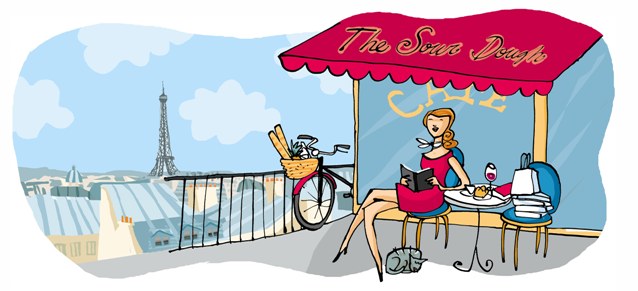Since I' m wearing my critic hat, which if you ask MBH I always have on, I want to post a review of a book I finished reading right before I left for Paris, “Julie and Julia : 365 Days, 524 Recipes, 1 Tiny Apartment Kitchen”. This memoir of Julie Powell’s year of cooking every recipe from the bellwether “Mastering the Art of French Cooking” by Julia Child has stirred quite a lot of controversy in the publishing, foodie and blogsphere worlds. It is roughly based around her blog, "The Julie/Julia Project" . Since the release of the book last fall, Julie Powell has been called everything from a pretender because she didn’t always follow the recipes in MtAoFC faithfully (she had problems finding some ingredients easily and lacked some of the cooking implements the recipes called for) to a genius in our own time. After reading the book, she may be a little of both. Basically, Julie Powell is like quite a few of us were when we moved from our 20’s into our 30’s; neither brilliant nor a “slacker” but just trying to make the wanderings most of us do in that stage of our lives mean something while seeking some validation from those we love.
Julie Powell was a secretary for a government agency in lower Manhattan in 2002 and stuck in a dead-end job. She was at the cusp of having her turning-thirty life crisis when a visit home to her folk’s house in Texas provided her with her epiphany to cook every recipe in MtAoFC in one year. She writes about how, as a child, she watched her mother cook from MtAoFC and how the book had always fascinated her. It was enjoyable to read how she overcame her aversion to eggs and her discovery that calf liver is quite tasty when prepared correctly. It was even gratifying to read about someone else coming to terms with boiling lobsters (something I suffer from everytime I place one in a pot of boiling water). What she doesn’t write much about and doesn’t provide anywhere in the book are any of the actual recipes she cooked from during her year. Throughout the book she talks obliquely about the recipes but only provides bits and pieces of the recipes and techniques that make MtAoFC a still must have in any cookbook collection. This is a life journey book with "Mastering the Art of French Cooking" as the vehicle.
There are some very humourous moments, like when Julie sends friends and her husband on an all Manhattan search for beef marrow bones and when she finally gets something from the gelatin family to set up properly. But, unfortunately, most of the last half of the book is a “poor me, why did I DO this” whine. About thirty pages from the end, I felt like screaming, “Just stop cooking!” Also, I’m not a prude and if you ask anyone I know, I’m as capable as the next person of liberally sprinkling my conversations and diatribes with the odd epithet or two (especially the “F” word). But, like many of Julie Powell’s critics, after a while I began to be distracted by the continuous use of these words to describe the food, her life, the apartment, and the task that she had set herself upon. I kept thinking to myself, “surely a person who professes to be a writer can find more creative ways of expressing her dismay, exhaustion, and frustrations”. When at last, we get to the final recipe on 365th night, Julie has one last meltdown upon hearing from a writer on the west coast that Julia may not be amused by Julie’s year long endeavor . This temper tantrum was the last episode of many similar espisodes that, for me, made the book less than enjoyable. I’ve read differing accounts of Julia Child’s actual feelings about Julie Powell from various sources including from Julia herself where she was asked about the Julie/Julia Project and replied that she “wished Julie the best”. Having spent years watching Julia on various television shows (including the original broadcasts of The French Chef) and even encountering her at various gourmet grocery stores and farmers markets while she lived in Cambridge, I could very well believe that Julia would both be amused, annoyed, and indifferent about Julie Powell and her project. It was just Julia Child's way.
The book does end on a high note as Julie receives the validation that set her on this monumental task. She discovers she is loved and can survive the beginnings of her new life as a writer. Finally, the parting scene of her husband complementing her on her Julia Child “warble” struck a chord with me. After all, who doesn’t hear Julia Child’s tremulous voice wishing us “Bon Appetit” from time to time when we have just finished cooking something we thought was particularly difficult but that turned out absolutely perfect?







